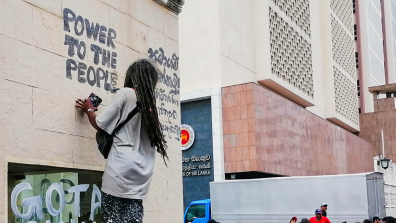Why union-busting must go out of fashion at Next

This statement from Next plc is a positive development for workers that have stood firm for their right to unionise and bargain collectively.
On 23 April, a letter from NML [Next Management Limited] was sent to the Joint Secretary of the union stating that, “Next Manufacturing Pvt Ltd recognizes the formal request of a number of NML Katunayake plant employees to be affiliated members of the above named union.”
We are waiting for the first meeting between the NML and the union to take place, at which point the union will be formally recognised as the collective bargaining agent for workers.
In January 2021, following a successful walkout to win back unpaid bonuses, garment workers at a Next owned factory in Sri Lanka (called Next Manufacturing Limited) formed a new branch of the FTZ&GSEU trade union. Workers reported intimidation, threats and discrimination, but stood firm. Now, nearly half of the garment factory workers are members of the trade union. According to Sri Lankan labour laws, this means that Next, as an employer, should accept the trade union as representative of its workers and engage in negotiations with them. Three months down the line and Next has still not done this.
Replying to War on Want and Labour Behind the Label’s letter asking why Next has not recognised the union, Next replied that it is “favourable to freedom of association… ” but added “We would also want to involve our Next Manufacturing Limited employees and the Joint Consultative Council, so that we can assess whether union involvement at Next Manufacturing Ltd is generally desired by our employees and is in the best interests of the workforce”.
This is not a decision for the company to make, as workers decided what was in their best interests when they joined a trade union of their choice. The Joint Consultative Council (JCC) is a structure set up by Next management. Next cannot insist that the union can only meet with the JCC.
As nearly half of the workforce has formed a trade union, which is an organisation of workers as defined by the ILO Conventions 87 and 98, Next cannot continue to justify refusing bilateral meetings with the union.
Next said: “we would very much welcome the opportunity to enter into discussions with the FTZ&GSEU union” but then cite Covid-19 travel restrictions as a reason why discussions cannot happen. Yet branch leaders and managers working in the Sri Lankan factory, and Next managers from outside Sri Lanka, already use remote video conferencing for other meetings. There is nothing stopping Next from engaging with the union immediately.
This is a clear case of union-busting – when an employer uses tactics to ignore, sideline or undermine a trade union to prevent workers from acting together to improve their pay and working conditions.
Why is this case important?
An estimated 400,000 workers, the vast majority young women, are employed in Sri Lanka’s garment factories, producing clothes for major fashion brands who have made vast profits on the back of workers’ long hours and poverty wages.
While International Women's Day was celebrated earlier this week, Next Manufacturing Company in Katunayake Free Trade Zone, and Sumithra Hasalaka and Sumithra Nittambuwa factories that supply clothing to Next and other UK brands, were denying their workers, predominantly women, their right to collective bargaining. At the Sumithra factories in Hasalaka and Nittambuwa, workers formed their unions back in August and September 2020 but have still not had their right to collective bargaining accepted. Instead union workers have been discriminated against in allocation of overtime, and senior managers openly tell workers to use the Employee Council rather than join a union.
Sri Lankan workers have experienced “systematic violations of rights”[1] by employers for decades, and during 2020, the effect of the Covid-19 pandemic further exacerbated this injustice. Many garment workers lost jobs without compensation, were not paid for work completed, or were underpaid – and were left in extreme hardship. Many unionised workers faced discrimination and even dismissal[2] as employer groups advocated for a roll back of labour rights laws. Factories have since re-opened, with little to no regard of Covid-19 health and safety requirements. There are consistent reports of employers using Covid-19 as an excuse to ‘downsize’ their workforce, while increasing the targets and hours of remaining workers to fulfil orders.
At a time when workers require more protection and representation than ever before, trade unions play a critical role in safeguarding workers’ rights. The right to organise and the right to collective bargaining are enshrined in the International Labour Organisation’s Declaration on Fundamental Principles and Rights at Work (1998). Next garment workers’ struggle to unionise and bargain collectively is important in an industry where too often fashion companies get away with denying workers these basic rights.
That is why we are calling on Next to make a public statement recognising the FTZ&GSEU trade union at its Sri Lankan factory by 19 March 2021, and agreeing to start talks with the union before the end of March 2021.
Workers must have their right to form a union and bargain collectively respected. It is essential in the fight for better working conditions that Next formally recognises and engages with the workers’ union. Next must respect and not undermine workers’ rights to collective bargaining through a trade union workers have freely chosen to join.



